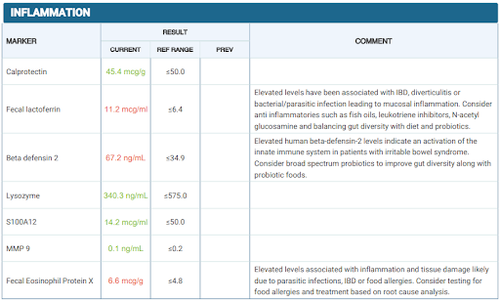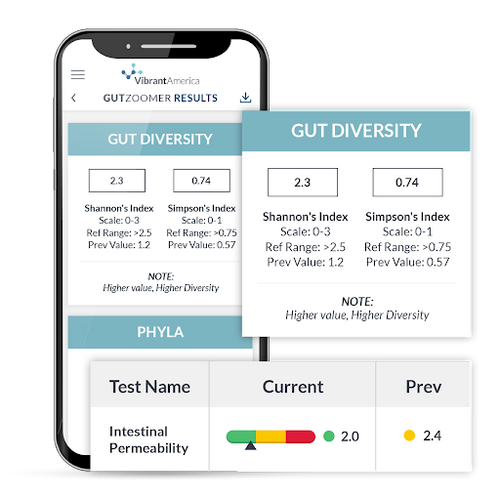![When SIBO Isn't SIBO [+ Why Your Doctor Is Getting It Wrong]](http://happygutlife.com/cdn/shop/articles/Sibo.webp?v=1726480591&width=1100)
When SIBO Isn't SIBO [+ Why Your Doctor Is Getting It Wrong]

![When SIBO Isn't SIBO [+ Why Your Doctor Is Getting It Wrong]](http://happygutlife.com/cdn/shop/articles/Sibo.webp?v=1726480591&width=1100)


Dr. Vincent Pedre - Oct 25 2023
Today I want to share an eye-opening story of one of my patients — let’s call her Linda. This narrative unravels the intricate web of gut health and how misdiagnoses can lead to months (or even years) of discomfort. It's a story that challenges our conventional understanding of gut-related issues like SIBO, and why it's crucial to dig deeper to find the real root causes.
Let's begin by addressing the elephant in the room ─ Small Intestine Bacterial Overgrowth, or SIBO.
This condition often confuses both patients and healthcare professionals, because its symptoms often overlap with those of other gut health problems, like SIFO (Small Intestine Fungal Overgrowth) and other hidden causes (read below to find out what I’m talking about).
The symptoms can range from abdominal discomfort, bloating, to digestive irregularities ─ anywhere from constipation to diarrhea. However, as I’ll show you in this case study below, SIBO is not the only possible culprit behind these common complaints.
Meet Linda, a resilient woman in her 60s who came to me with persistent bloating and constipation. Initially, her SIBO tests came back positive, and so she was treated for SIBO with a standard treatment antibiotic protocol, banking on the correlation between SIBO and bloating, thinking it was a slam dunk for her diagnosis.
The PROBLEM is it wasn’t! Her bloating persisted relentlessly. She underwent two more SIBO tests, both showing negative results, but the bloating continued, only managed by adhering to a strict low-FODMAP diet.
What could be the reason behind her prolonged bloating? If she had SIBO originally, shouldn’t she have improved with one or two rounds of antibiotics. Why didn't the treatment bring relief?
Many physicians often choose to prescribe the same remedy over and over, mostly in the form of Rifaximin (the most commonly prescribed antimicrobial for SIBO), thinking it's the right course of action. In fact, I’ve known gastroenterologists that have told my patients, “If the bloating returns, we’ll just treat you with another round of Rifaximin.”
What?!? Did we just throw out the “baby” (i.e. medical school training) with the bathwater?!? When did a non-specific symptom like bloating become diagnostic of a singular medical condition WITHOUT TESTING???
This “treat and repeat” approach is blatantly wrong! Over time, it leads to yeast overgrowth, dysbiosis (an imbalance of good and bad bugs in the gut), and ultimately fails to address the underlying root cause(s) at hand.

Picture credits: Freepik
The Science Behind Medical Misdiagnosis
It's a sad reality that many healthcare practitioners tend to overlook the fundamentals of the scientific method and instead rely on quick fixes. I've seen gastroenterologists do this when treating SIBO patients, saying: "There's no reason to test!" Ugh! It makes my skin crawl.
I can't believe doctors would sacrifice the scientific method after graduating from medical school and doing an evidence-based residency program, but it happens every day. The preference for “quick and dirty” medicine, powered by the insurance and pharma industries, has taken the place of the traditional, scholarly medical evaluation. Prescribing quick fix medications over digging deep to uncover the genuine underlying root cause(s) of the issues is the modern disease of the medical field.
As Linda's case reveals, a misdiagnosis can trap individuals in a cycle of ineffective treatments and prolonged discomfort. To find what was truly going wrong with Linda, I ordered a Gut Zoomer 3.0 (btw, you can order the same gut tests I use with my patients here).
Unmasking the True Culprit

In Linda's situation, the symptoms she experienced were not solely due to SIBO. In fact, her SIBO had probably resolved after the first or second round of antibiotics. What she was harboring inside her gut was as mysterious as it was shocking to find.
But first, I had to order the right test. You see, regular stool cultures and parasite analysis that your primary care doctor or gastro might send you to get aren’t good enough. They often (more than 90% of the time) miss the mark.
To find the real reason behind her suffering, we had to venture beyond the conventional paradigm. In order to cast the widest next possible, we tested her gut for a wide array of functional inflammatory markers (see Figure 1 below).

Figure 1.
This comprehensive testing, including a stool microbiome PCR, revealed the true underlying cause of her symptoms (it was actually a bit shocking to see this) ─ a parasitic infection with a parasite known as Giardia lamblia (See Figure 2 below).

Figure 2.
Giardia is a microscopic parasite that usually manifests with diarrhea. However, Linda's case proved that the absence of this common symptom doesn't rule out the presence of Giardia. It is essential to remember that even individuals leading a healthy lifestyle can still fall victim to Giardiasis.
Providing Immediate Relief (Conventional vs. Natural)
In my extensive professional experience, I have seen firsthand the profound relief that antiparasitic medications can offer in the case of severe parasitic infections. When dealing with a formidable opponent like Giardia, I often lean towards Nitazoxanide, typically administered at 500 mg twice a day, and repeated after two weeks to make sure to get the parasite in its full lifecycle.
Combining this medical approach with herbal anti-parasitics ensures that we eliminate the parasite thoroughly. The key takeaway here is that, even though I’m calling out conventional medical laboratory analysis as limited, in certain situations conventional treatment does provide rapid relief. Therefore, it's essential to maintain an open-minded approach, combining traditional and natural remedies for the most effective results.
The Importance of Being Proactive
At the core of Linda's story lies a crucial message ─ when symptoms and tests disagree, keep digging for the true underlying cause. In the face of negative test results that persist while symptoms endure, it's time to broaden the scope of the investigation. Repetitively treating the same condition without considering alternative explanations is akin to the widely attributed definition of insanity ─ doing the same thing over and over and expecting different results.
“Insanity is when you do the same thing over and over and expect a different result! ”
If you experience symptoms akin to SIBO, yet your breath tests turn up negative, it's time to expand your diagnostic horizons. Consider opting for a Stool PCR test, such as the Gut Zoomer 3.0 Complete, which offers a comprehensive analysis of your gut health.
The Gut Zoomer Test: Unveiling Comprehensive Insights
The Gut Zoomer (as I like to call it, for short) from Vibrant Wellness offers a holistic assessment of your gut microbiome, probing into potential underlying causes of chronic diseases. By evaluating pathogens in the gastrointestinal system, it assists in identifying the microorganisms contributing to gut-related conditions.
This innovative test delves into three different types of dysbiosis:
1. Dysbiotic Gut Microbiome: Characterized by the loss or absence of beneficial microorganisms.
2. Overgrowth of Opportunistic Bacteria: Identifies problematic bacterial overgrowth.
3. Lack of Microbiota Diversity: Highlights potential issues arising from insufficient bacterial diversity. I get into the importance of microbial diversity in my book, The GutSMART Protocol. >>> Get a free chapter here <<<
The Gut Zoomer Test measures over 300 microorganisms, providing a comprehensive overview of your gut microbiome via a proprietary microarray hybridization technology. Moreover, it offers valuable recommendations for 35 commonly used probiotics based on your specific risks.
What Does The Gut Zoomer Measure?

Unlike other gut stool PCR tests that only offer a small subset of other gut markers, the Gut Zoomer tests for the colonic short-chain fatty acid production, inflammatory markers, digestion, and absorption markers, among other important markers of gut health. It provides data that can be used to personalize nutrition, supplements, and probiotic recommendations, and lifestyle recommendations based on your unique test results.
The Gut Zoomer uses an exclusive microarray hybridization technology platform that leverages whole-genome data. This means it gives us a much more comprehensive analysis than a lot of the commercial tests that are being marketed to you do. This allows for the simultaneous detection of over 300 microorganisms with an exceptional 99% specificity and 98% sensitivity. What these numbers mean is that the test has a high sensitivity and also a very high negative predictive value, so that a negative test is unlikely to be a false negative. These levels of accuracy are unprecedented in identifying pathogenic microorganisms.
Unlike other 16sRNA sequencing technology, which can be time-consuming and prone to higher inaccuracies, the Gut Zoomer stands as one of the most precise microbiome tests available.
No Multi-Stool Collection!
(Just one, single specimen needed)
This test conducts the most thorough analysis currently available for your intestinal microbiome ecosystem, all from a single, straightforward stool sample. It delves deep into the intricate relative abundance of each species or genus, evaluating their relationships within the broader ecosystem.
This approach provides a distinctive viewpoint on the gut microbiome and its associations with diseases and inflammation. Now don’t me wrong, we are still learning a lot when it comes to the gut microbiome, and there’s not one test that gets all of it perfectly. So, tests need to be interpreted to filter out the most usable data.
The inclusion of functional digestive analytes is a valuable asset for any healthcare provider, whether they are an MD, DO, ND, or NP, enabling them to identify whether deficiencies in digestive enzymes, bile, or other essential metabolites are the underlying culprits responsible for gastrointestinal inflammatory symptoms.
In other words, just looking at the microbiome alone does not give you a full picture of what’s going on inside your gut. We need the wide array of functional markers to get a clearer picture of the inside ecosystem, how it’s behaving, and what interventions are going to help the most.
Ordering Your Stool Test
Unveil the underlying causes of your symptoms by taking charge of your health. Rather than relying on a doctor who may be ordering limited scope stool tests that say nothing about how your gut is really functioning, you can take proactive steps to understand the root cause of your discomfort.

You can order your own Gut Zoomer Test directly through Dr. Pedre's Gut Health LabShop*, and take the first step towards a more accurate diagnosis and effective treatment. Don't wait for your physician to tell you everything is fine when you know it isn’t – empower yourself with the knowledge needed to reclaim your health.
The Giardia Enigma
Giardia lamblia, a parasitic infection, may not always present with diarrhea, which is a common misconception. In fact, Giardia often disguises itself, making it challenging to identify. This parasite can infiltrate even the healthiest of lifestyles, demonstrating the ease with which it can be contracted. Giardia is a food-borne pathogen that you can get from drinking contaminated water or eating contaminated food.
I too, had a firsthand encounter with Giardia, back in January 2021, while visiting Lake Atitlan in Guatemala. The symptoms were quite severe, featuring almost 12 hours of relentless diarrhea⸺an experience that can only be described as utterly debilitating. I had to have a nurse come to the place where I was staying to administer two bags of IV solution in order to revive me after all the fluids I had lost. It was horrendous! I wouldn’t wish it on my worst enemy.
Have you been there? It's an ordeal that can only be described as physically and emotionally debilitating. It's the worst feeling ever. Dealing with a parasite is one of the most difficult things people can face, and yet, so many are infected without knowing it. Worldwide, the estimated prevalence is of giardia is 200 Million with up to 500,000 deaths per year. The infection rates vary from 2 - 5% in developed countries to 20 - 30% in developing nations. (PMID: 35290402)
A More Holistic Approach
While my unwavering belief in natural remedies stands strong, I've also recognized the profound and immediate relief antiparasitic medications can offer, especially in cases involving severe parasitic infections such as Giardia. This approach is further fortified with antiparasitic herbs, ensuring the complete eradication of the parasite.
The Final Word: Be Proactive, Take Control
{Gut Zoomer 3.0 Complete }
Linda's story serves as a compelling reminder of the paramount importance of being proactive about our health. Instead of relying solely on conventional tests and repeated misdiagnoses, it’s imperative to explore other possibilities and seek a more accurate diagnosis.
>>> Order your Stool Test through Dr. Pedre's Gut Health LabShop*
Take control of your well-being, and break free from the cycle of ineffective treatments. It’s time to take charge of your health today! Your root cause (perhaps a parasite) is waiting to be discovered, and a lot of the underlying issues that plague our health often don’t cause a lot of recognizable symptoms to begin with.
*Restrictions may apply, and certain kits may not be available in select states.